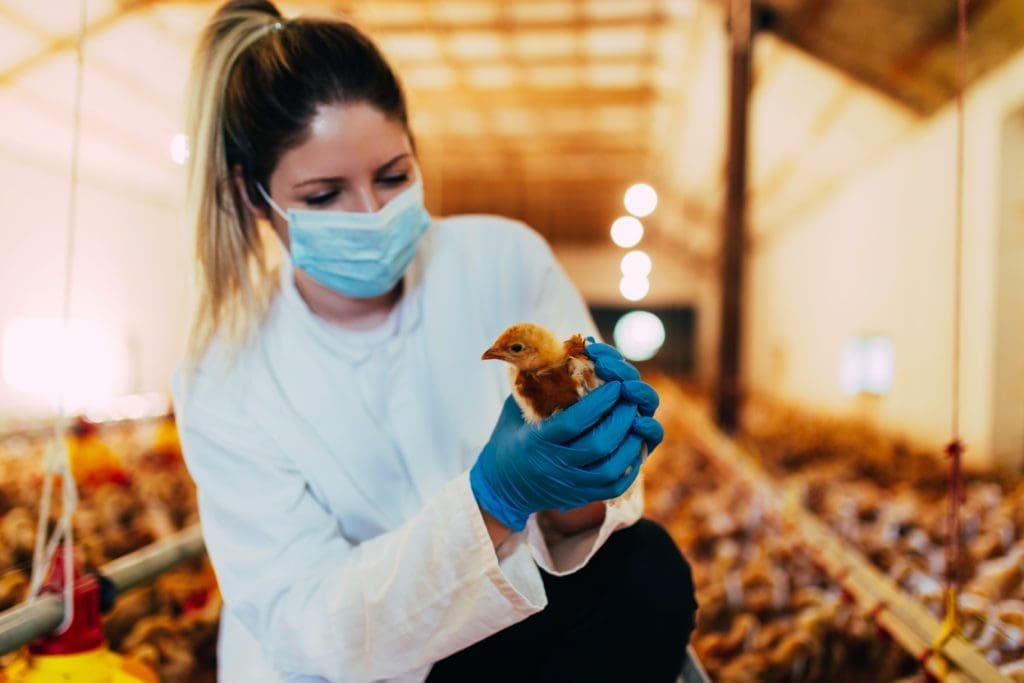Your Bird Flu Questions, Answered

This winter, reported cases of birds infected with avian influenza have risen in the Kansas City area.
While the public health risk for humans remains low at this time, this highly contagious disease is deadly for wild and domestic birds. To help prevent the further spread of illness, the Missouri Department of Conservation encourages residents to avoid touching dead or injured birds and to report any sightings of dead geese.
Often known as “bird flu,” influenza virus outbreaks in wild birds and poultry are prevalent. Humans are not immune to becoming infected. Although human infections are rare and tend to be much milder, it is important that we continually study these viruses. The potential for viruses to rapidly evolve can affect public health risk.
Read below to find answers to frequently asked questions about avian influenza.
Last updated 1/27/2024.
Frequently Asked Questions
What is avian influenza?
Avian influenza, or bird flu, refers to the disease caused by infection with avian (bird) influenza (flu) Type A viruses. These viruses naturally spread among wild aquatic birds worldwide and can infect domestic poultry and other bird and animal species. Bird flu viruses do not normally infect humans, but sporadic human infections have occurred.
How is avian influenza transmitted?
Wild waterfowl and other species shed the virus into the environment through their feces, saliva, and nasal secretions. Bird flu viruses can easily spread from wild birds to domestic birds and back again.
If you raise backyard poultry or ducks, your birds can get bird flu if they have contact with infected wild birds or share food, sources of water, and environments with them.
In Missouri, the wild birds most impacted by avian flu in recent years include raptors (hawks, bald eagles), waterfowl (ducks, geese), seabirds, and shorebirds. Most common songbirds or other birds found in the yard, like cardinals, robins, sparrows, blue jays, crows, or pigeons, do not usually carry viruses that are dangerous to poultry or people.
What should I do about my bird feeders?
According to the Missouri Department of Conservation:
It is not necessary to remove backyard bird feeders. Songbirds do not appear to be major carriers of this virus, so are at low risk from this avian influenza strain. Widespread removal of feeders is not an effective way to reduce the spread since waterfowl and raptors do not visit bird feeders frequently.
However, removing bird feeders is a wise precautionary measure for anyone who also keeps chickens, ducks, or other domestic birds.
What should the general public do to protect themselves against bird flu?
As a general precaution, avoid direct contact with wild birds and observe them only from a distance. Wild birds can be infected with viruses without appearing sick.
Similarly, avoid contact with birds that appear sick or have died of unknown causes. Take common-sense precautions, like not touching surfaces contaminated with bird feces.
If you accidentally touch a sick or dead bird, wash your hands thoroughly. Monitor yourself for new symptoms and contact your health provider if you become sick.
As a reminder, it is safe to eat properly handled and cooked poultry and poultry products in the United States. The proper handling and cooking of poultry and eggs to an internal temperature of 165˚F kills bacteria and viruses, including bird flu viruses.
Can people get the avian influenza virus? How is it spread?
Human infections with bird flu viruses are rare but possible, usually after close contact with infected birds.
The current risk to the general public from bird flu viruses is low. In humans, the symptoms of bird flu are typically mild.
It is important to remember that risk depends on exposure, and people with more exposure, such as farmers, might have a greater risk of infection. There is existing federal guidance around bird flu exposures for different groups of people (including hunters, poultry producers, and the general public) on the CDC website.
Should I be concerned about my pets?
If you have pet chickens, ducks, or other domestic birds, yes, you should take precautions. Close contact with wild birds and their droppings can lead to infections among poultry, as can visitors from infected flocks. Click here to read recommendations for poultry owners.
Contact your veterinarian and the Missouri Department of Agriculture’s Animal Health division at (573) 751-3377 if you see sickness in domestic birds.
If you own other pets that may eat or come into contact with sick/dead birds, it is possible (but less likely) that they could get bird flu.
While bird flu viruses primarily infect wild birds and domestic poultry, they can infect other animals too. Bird flu viruses can sometimes infect animals that eat infected birds, as well as animals in environments with a high concentration of virus. This can include wild animals, like foxes, as well as domestic animals, such as cats and dogs.
While you are very unlikely to get bird flu from intermediary animals like cats or dogs, you can help prevent the disease from spreading further. The Missouri Department of Conservation recommends making sure your pets don’t come into contact with dead animals.
What do I do if I find a sick or dead bird in my yard?
First: do not touch dead geese or other wild birds. To prevent the spread of disease, keep your pets away as well.
Infected birds may exhibit symptoms such as tremors, head tilting, lethargy, loss of coordination, or trouble standing upright. Finding several dead birds together can be a strong indicator of avian flu.
To report sick or dead wild birds, please email the Missouri Department of Conservation at wildlifehealth@mdc.mo.gov. As of December 2024, the Missouri Department of Conversation also asks that you report any sightings of dead geese by using their online form.
(For sickness in domestic birds, please contact your veterinarian and the Missouri Department of Agriculture’s Animal Health division at (573) 751-3377.)
If you do accidentally touch a dead goose or other wild bird, wash your hands thoroughly. Contact a healthcare provider if you experience any unusual symptoms.
I hunt ducks or other waterfowl. Is it safe for me to eat wild birds right now?
Yes, normal cooking temperatures are enough to kill the virus. Be sure to cook meat to an internal temperature of 165 degrees Fahrenheit.
However, hunters should take precautions to avoid the spread of bird flu. Here’s what the Missouri Department of Conservation has to say:
Due to ongoing waterfowl hunting seasons, waterfowl hunters should dress game birds in the field whenever possible or at a location away from poultry or other birds. Hunters should also properly dispose of harvest waste by placing the remains in trash bags and disposing of them through trash collection or a permitted landfill. Bald eagles and other raptors are particularly susceptible to avian influenza. This simple action could help prevent bald eagle and other raptor mortalities.
Hunters should also be aware it is possible to transport avian influenza viruses on boats, waders, or other equipment, especially if it isn’t dry before moving it from one site to another. Allowing hunting equipment to dry between outings will reduce this chance.
What does Jackson County Public Health do for avian influenza cases?
People who have been exposed to animals that tested positive for bird flu are contacted by a disease investigator. They will monitor the individual daily for signs of influenza for 10 days. So far, no contacts that have been monitored by Jackson County Public Health have developed signs of bird flu.
Information sourced from the Centers for Disease Control and Prevention and the Missouri Department of Conservation.
Archives
- February 2026 (1)
- December 2025 (1)
- November 2025 (2)
- September 2025 (1)
- July 2025 (2)
- June 2025 (3)
- April 2025 (2)
- January 2025 (2)
- December 2024 (1)
- September 2024 (2)
- August 2024 (2)
- July 2024 (1)
- June 2024 (1)
- February 2024 (1)
- July 2023 (1)
- March 2023 (1)
- October 2022 (1)
- September 2022 (1)
- August 2022 (1)
- July 2022 (2)
- June 2022 (2)
- May 2022 (1)
- April 2022 (4)
- March 2022 (1)
- February 2022 (1)
- January 2022 (1)
- December 2021 (4)
- November 2021 (3)
- September 2021 (2)
- August 2021 (3)
- July 2021 (2)
- June 2021 (1)
- May 2021 (2)
- March 2021 (1)
- December 2020 (6)
- November 2020 (8)
- October 2020 (4)
- September 2020 (7)
- August 2020 (3)
- July 2020 (11)
- May 2020 (2)
- April 2020 (4)
- March 2020 (1)
Categories
- Communicable Disease (5)
- Clinical Services (19)
- Clinical Servcies (1)
- Health Promotions (74)
- Emergency Preparedness (8)




